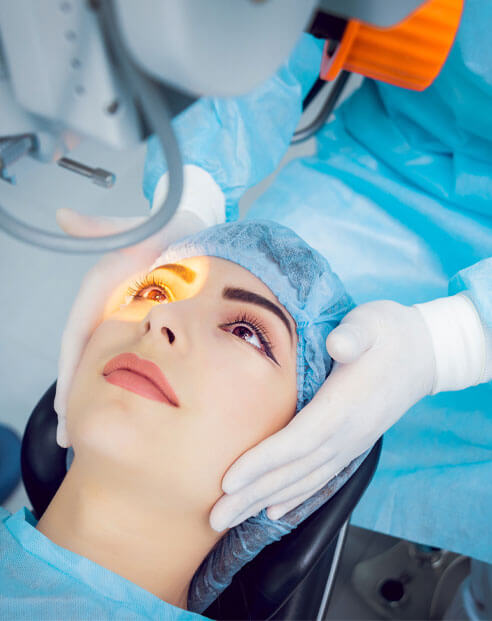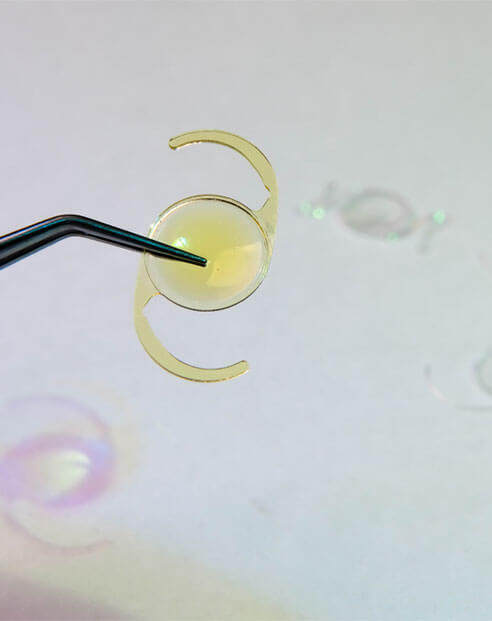Cataract surgery in Turkey
What is cataract surgery?
Cataract surgery is used to restore vision loss related to cataracts. During surgery, the clouded lens inside your eye will be replaced with a clear artificial lens.
Cataract surgery in Turkey is one of the safest and most effective vision surgeries. Millions of cataract surgeries are performed each year, and the vast majority have excellent visual outcomes.
Free express quote
Price
What is the price of cataract surgery in Turkey?
The cataract surgery fee in Turkey covers all stages of your medical stay and includes surgeon and anesthesiologist fees, luxury hotel accommodation, clinic and transportation in Turkey.
Don't hesitate to request your free personalized quote to get the price of your cataract surgery.

Get a free quote or make an appointment.
Patient guideWho should undergo cataract restoration surgery in Turkey?
If you have a cloudy cataract, it doesn't always mean you need surgery. You
may not notice a
change in your vision. Some people with this disease see just fine if they wear prescription
glasses, use a magnifying glass or rely on brighter lighting.
But as cataract disease
develops, it can cause more symptoms. You may have weak or blurry vision. You may also have
double vision.
You may have poor night vision and find it harder to drive when it is dark.
You may be sensitive to headlight glare.
How to prepare for cataract surgery?
Before scheduling cataract surgery in Turkey, your ophthalmologist will perform:
- A comprehensive eye exam to check the overall health of your eyes and decide if you have a problem that will prevent you from undergoing surgery.
- A refractive examination will also be performed to determine your degrees of nearsightedness, farsightedness and astigmatism prior to surgery.
- Additional examinations of your eyes will be performed to determine the type of lens you need.
What's going on
What happens during cataract surgery?
During cataract surgery, the cloudy lens inside your eye will be removed and replaced with a clear artificial lens, called an intraocular lens (IOL). The new lens helps restore the clear vision you had before the cataract developed.
Special precautions are taken to ensure that you are completely relaxed and pain free. Some patients may feel a slight pressure sensation, but it is not painful.
Here are the basic steps of a typical modern cataract surgery:
- A small incision is made on the side of the cornea.
- An ultrasound device or high-frequency laser is used to carefully break the cloudy lens into small fragments.
- The lens fragments are gently removed from the eye by aspiration.
- Once all fragments are removed, the surgeon inserts the artificial lens safely behind the pupil and the colored part of the eye (iris) in the same location as your occupied natural lens.
- The incision heals on its own without the need for stitches.
- A protective dressing is placed over the eye to keep it safe during the early stages of recovery.
If you need surgery on both eyes, your cataract surgeon will typically wait one to three weeks between surgeries to give the first eye a chance to heal.

Schedule Consultation and receive your Free Quote
Patient guideTypes
What are the different types of cataract surgery in Turkey?
simply phaco. A phacoemulsification procedure uses high-frequency ultrasound to break up the lens.
Phaco surgery is now performed with smaller incisions, so healing is faster and the risk of complications is significantly reduced.
There are three main types of IOLs that can be implanted during cataract surgery:
- Monofocal lenses are the standard option for most surgeries. These may still require the use of prescription glasses or reading glasses after surgery. If prescription glasses are needed, your eye doctor will prescribe them about a month after surgery. Eventually, presbyopia can be treated by adjusting the power of one of your monofocal IOLs to create what is called monovision.
- Adaptive lenses and multifocal lenses are available for patients with presbyopia. These lenses can correct your near vision without sacrificing your distance vision. Both of these IOLs offer a wider range of vision after cataract surgery than conventional monofocal lenses.
Extracapsular surgery is also an option for cataract surgery in Turkey. Instead of breaking up the cloudy lens with ultrasound, the surgeon will remove the nucleus in one piece, then the rest with suction. Extracapsular surgery involves a longer incision and antibiotic eye drops before the operation. This type of cataract surgery is usually performed only in complicated cases.
Recover
How to recover after surgery?
For a few days after surgery, your eye may itch or you may feel pain. During this time, you may also have tears and have trouble seeing well in bright light.
Your doctor will administer eye drops to prevent infection. Driving will be prohibited and you should not bend over, pick up heavy objects or put pressure on your eyes.
During the first week, your doctor will probably suggest that you wear eye protection while you sleep. This protects the site of your surgery so that your eye can heal without complication.
What is the outcome of cataract surgery in Turkey?
After 8 weeks, your eye should be completely healed. About 90% of people see better after cataract surgery. But don't expect your vision to be 100% restored.
You may still need to wear glasses or contact lenses to further optimize your vision.

